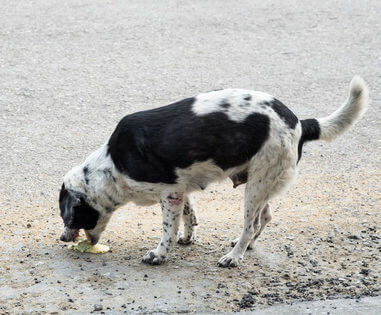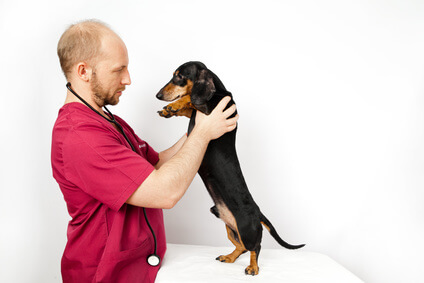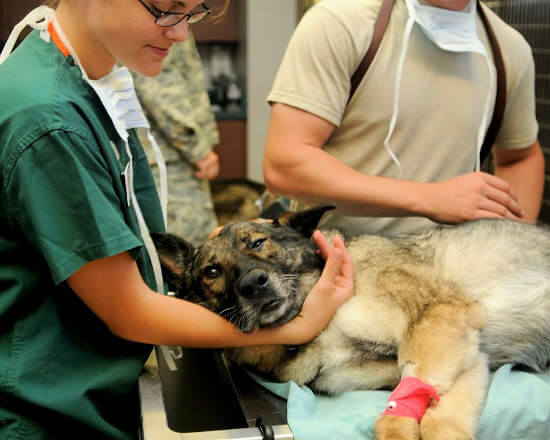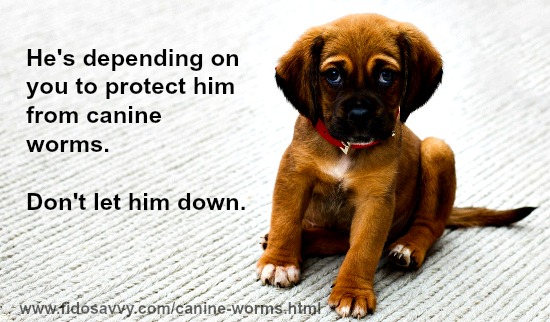FYI: If you buy something through a link on this site I may earn a commission - at NO extra cost to you.
How To Treat Puppy Vomiting
The only way to treat puppy vomiting effectively is to first figure out what's causing the problem, and also to determine how severe it is (this will help you to decide whether you can safely try to treat it yourself or whether you need veterinary help right away).
There are some very serious dog illnesses which
include vomiting among the early, and most common, symptoms, but
throwing up can also be caused by simple things like a dietary change,
stress or eating something they shouldn't.
Your first step is to find out more about the causes and types of vomiting which happens in puppies, CLICK HERE to learn more.
To jump to specific areas of this page use these links:
- How to treat severe puppy vomiting
- How to treat mild puppy vomiting
- How a veterinarian treats vomiting in puppies
- Chronic vomiting in dogs and puppies

How To Treat Severe Puppy Vomiting
Never try to treat puppy vomiting which is repetitive, forceful or which contains blood, yourself.
This type of vomiting is called 'Acute' vomiting and ALWAYS needs to be evaluated by a veterinarian immediately, to avoid potentially serious complications or consequences.
Acute puppy vomiting includes one, or several, of the following:
- Repeated, forceful vomiting
If your puppy has vomited several times over a period of 3 - 4 hours, has emptied his tummy, and continues to vomit he needs veterinary help immediately. - Also has diarrhea or other symptoms of illness
Puppy vomiting that is accompanied by diarrhea, lethargy, loss of appetite, panting, pacing or other signs of distress or illness needs to be evaluated by a veterinarian immediately. - Blood in the vomit
Blood in your puppys' vomit could indicate significant irritation/inflammation of the esophagus, stomach ulcers or a bleeding disorder of some sort. The blood can be bright red, or may be dark and look sort of like coffee grounds. - Evidence of foreign objects in vomit
If you see pieces of non-food items (such as string, plastic, cloth etc.) in Fidos' vomit, get him to the veterinary clinic right away. If he is 'retching' or 'dry heaving', strains to poop but isn't able to pass anything, or seems distressed in any way this could be an emergency - Has a distended belly and seems distressed
These can be symptoms of Bloat (also sometimes called Torsion), and this condition is most common in large and giant breeds. It is much less likely to happen to puppies than it is to adult dogs but it CAN happen, and is deadly serious if it does.This is an emergency situation.

Remember, please never try to treat puppy vomiting like this at home or by yourself. You need to get your little one to a veterinarian.
Warning....
One of the most common causes of severe, repeated vomiting in puppies is the very serious, potentially deadly disease called Canine Parvovirus.
'Parvo' can kill a young puppy within 24 hours (that's not an exaggeration) and it's absolutely heartbreaking to have this happen to your precious pup
How To Treat Mild Puppy Vomiting
It's sometimes possible to treat mild puppy vomiting at home... or at least to take a 'wait and see' approach for twenty-four hours.
These options are ONLY appropriate IF... your pup vomits once or twice, and isn't showing any other symptoms and he doesn't act or appear to be sick.
If your puppy is active, playful and will eat and drink without problems and is acting normally then it may be something minor that's causing him to throw up.
In this situation, you might be able to figure out what's causing the problem and either treat the puppy vomiting yourself, or take a 'wait and see' attitude for 24 hours or so, and give it a chance to clear up on it's own.

Here are some things that might cause a temporary, and relatively mild, tummy upset in puppies, and how to treat them:
Eating Forbidden 'Stuff'
Puppy vomiting due to eating something he shouldn't have (BUT NOT SOMETHING THAT IS TOXIC) usually causes your pup to look pretty sorry for himself, and to be a bit quieter or less energetic than normal.
This is usually pretty self-limiting and lasts 24 hours or so. Fido may also have a little diarrhea as well, but will otherwise seem fairly normal. No real lethargy, or distress, and will drink water and be able to keep it down.
Your puppy will need to drink plenty to combat any dehydration caused by the vomiting, but if he doesn't seem better the next day, or gets worse at any time, you need to have him examined by your veterinarian.
If little Fido has ingested something toxic though he might be in real trouble, even if he seems okay right now. There are lots of common foods and household products that are deadly for dogs, check out this page to find out what everyday foods and household things are poisonous for dogs.
A Sudden Change in Diet
A new puppy food, some table scraps, or different treats and so on, can cause tummy upset. Puppy vomiting that you're sure is a result of this sort of dietary change, usually works itself out within a couple of days. Again, you shouldn't see any other signs of illness in your puppy (other than maybe a little diarrhea), and he should seem happy, healthy and active otherwise.
Make sure your puppy drinks plenty of water and watch him carefully. If he doesn't improve, or gets worse, take him to your veterinarian for evaluation.
You can usually avoid this sort of tummy upset in puppies by making any dietary changes gradually.
If you need to change his brand of food for example, make the transition over a period of about a week or so, gradually introducing the new and phasing out the old.
Also don't suddenly start giving your puppy 'extras' such as bones, fancy treats, or 'edible chew toys', introduce them a little at a time.
Intestinal Worms
A bad case of dog worms can cause puppy vomiting, and the vomit might even contain the worms themselves.
Diarrhea (which may or may not also contain worms), changes in appetite, a dry dull coat and/or general malaise may also be noticeable.
If your puppy has been given a deworming medicine, then you can probably wait a day and see if it gets better, but if he hasn't been dewormed yet, see a vet right away for the because worms can cause serious problems if left untreated.
Medication Side Effects
Some medications can have side effects, including making your pup feel nauseous, or actually make him throw up . The most common 'culprits' are worm medications, anti-biotics, certain painkillers, drugs used to treat heart problems or Cushings' disease, high doses of steroids, and chemotherapy.
If this happens, talk to your veterinarian. Sometimes you can give certain drugs with food which helps to offset the nausea effect, or change to another medicine. In many cases, the vomiting wears off as your dogs' body adjusts to the medication.
A Too-Empty Tummy
If your puppy vomits a small amount of yellow or green foam or fluid, especially first thing in the morning, it's possible his tummy is just too empty.
A build-up of stomach acid overnight (due to his tummy being empty and the acid having nothing to 'work on') is often to blame. You can often treat puppy vomiting like this by giving your pup a handful of kibble, or a few plain dog biscuits about an hour before bedtime.
How A Veterinarian Treats Puppy Vomiting
A diet adjustment is the first step a veterinarian may use to treat puppy vomiting.
This is something you can do at home if your dog has vomited once or twice but is otherwise acting normally. It also is commonly recommended by veterinarians as part of the treatment regimen for more severe cases.
We want to give the stomach a break and feed only bland, highly digestible foods. Stop giving his regular food and treats and offer white rice and plain boiled chicken instead. Even better, you can feed canned prescription GI food available from your veterinarian. These diets are more nutritionally balanced than chicken and rice and are specially formulated for dogs with gastrointestinal upset.
Start with a very small amount of food. If he eats it and keeps it down, you can gradually increase the amount fed every few hours. When the vomiting has completely resolved, slowly transition back to the regular diet.
If your puppy occasionally vomits bile in the mornings but is otherwise healthy, it is sometimes due to gastric acid buildup in an empty stomach. Trying feeding a small meal right before bed. Some antacid medications can also help, but you should always ask your vet for recommendations before giving any over-the-counter drugs.
If your puppy has persistent or frequent vomiting or is exhibiting other signs of illness, bring him to the veterinarian as soon as possible.
After a physical exam, your vet will recommend the appropriate diagnostic testing. Depending on the severity of the problem, this may include:
- A fecal exam to check for parasites
- X-rays of the abdomen
- Bloodwork to check organ function and blood cell counts
If your puppy appears healthy and the tests come back negative, he may just need supportive treatments to help him feel better. This often includes an injection of Cerenia (maropitant), a powerful anti-nausea medication. Cerenia is safe and very effective--most dogs will stop vomiting after a single dose.
If your puppy vomits despite Cerenia treatment, it is a worrysome sign that more serious disease, such as parvovirus or intestinal obstruction, could be present. In addition to anti-nausea injections, your vet may recommend subcutaneous fluid therapy to maintain hydration, a bland diet, and anti-diarrheal medication if warranted.
If your puppy is severely ill or very dehydrated, he may need to be hospitalized. Severe dehydration can lead to worsening nausea and other systemic effects, and puppies can become dehydrated very quickly compared to adult dogs. Simply drinking water is not usually enough, and may even exacerbate vomiting.
Intravenous (IV) fluids are the most efficient way to restore hydration and will require at least 1-2 days in the hospital.
During hospitalization, your puppy will receive injectable anti-nausea and/or antibiotic medications, which allows his stomach to settle. Hospitalization is often required for puppies diagnosed with parvovirus or other severe gastrointestinal illnesses.
Intestinal obstruction is another serious cause of vomiting, and results from ingestion of foreign objects such as toys or clothing items. Obstruction is diagnosed via x-rays or other imaging studies. If your dog has an object in the stomach, some hospitals can retrieve it via an endoscope inserted down the esophagus.
However, for most cases of obstruction, your puppy will need surgery to remove the object directly from the GI tract. It is important that surgery is completed in a timely manner to prevent damage to the intestinal tissue.
As you can see, treatment for vomiting in puppies varies greatly depending on each individual case. If your dog has been vomiting for a long time, treatments will need to be more aggressive. It is best to get your puppy to the vet early so he can get on the road to recovery as soon as possible.
Author: Dr. Megan Teiber, DVM
Chronic Vomiting in Dogs or Puppies
If your puppy or older dog experiences chronic vomiting (ie he vomits on a regular basis, maybe once a day or several times a week), but doesn't seem to be acutely unwell, have him seen by your veterinarian as soon as you can, but it isn't necessarily an emergency.

Conditions such as canine acid reflux disease (can cause a puppy to vomits a yellow or greenish liquid especially in the morning), irritable bowel syndrome, ongoing liver disease, hormonal imbalances or congenital diseases can all cause vomiting but are MUCH less likely to be seen in puppies than they are in adult dogs.
Only your veterinarian can advise you on this, so treat a puppy/dog who is vomiting on a regular basis (even if he seems fine otherwise) by getting him in for a check up.
If your puppy is throwing up, always talk to your vet before giving over-the-counter or human medicines. Some human medications are generally safe for dogs, but it's always safer to check first. Even if a specific drug is okay to use, it's important to get the medication dosage exactly right
Also, there are some popular human medications which are toxic to dogs, you need to avoid these at all costs.
For your peace of mind, puppy and dog health information on this site has been approved by veterinarian Dr. Megan Teiber, DVM
you might also like...
- Home
- Puppy Health
- Puppy Vomiting
- Treat Puppy Vomiting
FTC Disclosure: Some pages on this site contain affiliate links. I may earn on qualified purchases.






